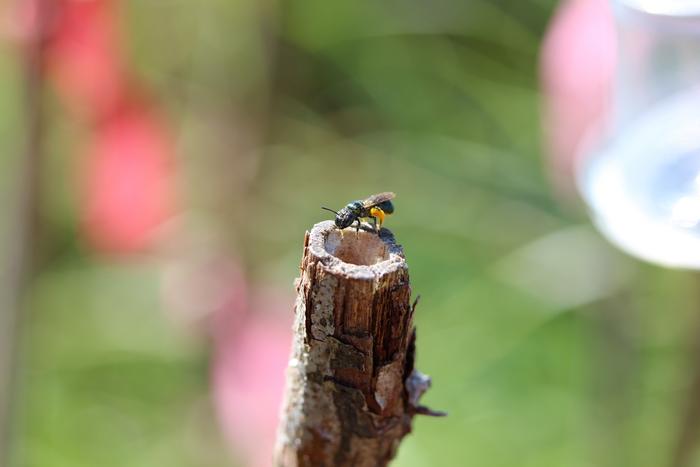TORONTO, Sept. 14, 2023 – Most wild bees are solitary, but one tiny species of carpenter bees fastidiously cares for and raises their offspring, an act that translates into huge benefits to the developing bee’s microbiome, development and health, found York University researchers.

Credit: Sandra Rehan, York University
TORONTO, Sept. 14, 2023 – Most wild bees are solitary, but one tiny species of carpenter bees fastidiously cares for and raises their offspring, an act that translates into huge benefits to the developing bee’s microbiome, development and health, found York University researchers.
Not unlike the positive affect human mothers can have on their offspring, the maternal care of these carpenter bees (Ceratina calcarata) staves off an overabundance of harmful fungi, bacteria, viruses and parasites in the earliest stage of development.
Without maternal care the pathogen load of these developing bees ballooned – 85 per cent of were fungi, while eight per cent were bacteria – which can impact their microbiome, a critical component of bee health, as well as their development, immune system and gene expression. This can lead, for example, to changes in brain and eye development, and even behaviour. The biggest single fungus found was Aspergillus, known to induce stonebrood disease in honey bees, which mummifies the offspring. In later stages, the lack of care can lead to a reduced microbiome, increasing susceptibility to diseases and poor overall health.
The researchers looked at four overall developmental stages in the life of these carpenter bees starting with the larvae stage both in the presence and absence of maternal care.
“There are fitness affects resulting from these fungal infections. We are documenting the shifts in development, the shifts in disease loads, and it is a big deal because in wild bees there is a lot less known about their disease loads. We are highlighting all of these factors for the first time,” says senior author Sandra Rehan, a professor in York’s Faculty of Science.
The developmental changes sparked by which genes were expressed or supressed, upregulated or downregulated, along with disease loads, depending on the presence or lack of maternal care, created knock-on effects on the microbiome and bee health. These single mothers build one nest a year in the pith of dead plant stems where they give birth and tend to their offspring from spring to as late as fall. Anything that prevents the mother from caring for her young, increases risks of nest predation and parasitism, including excessive pruning of spring and fall stems, and can have huge consequences on their young.
The paper, The effects of maternal care on the developmental transcriptome and metatranscriptome of a wild bee, was published today in the journal Communications Biology. Lead author Katherine Chau of York University is a Mitacs Elevate and Weston Family Foundation Microbiome Initiative postdoctoral fellow.
“We found really striking shifts in the earliest stages, which was surprising as we did notn’t expect that stage to be the most significantly changed,” says Chau. “Looking at gene expression of these bees you can see how the slightest dysregulation early in development cascades through their whole formation. It is all interconnected and shows how vital maternal care is in early childhood development.”
This study provides metatranscriptomic insights on the impact of maternal care on developing offspring and a foundational framework for tracking the development of the microbiome. “It is a complex paper that provides layers of data and shows the power of genomics as a tool,” says Rehan. “It allows us to document the interactions between host and environment. I think that is the power of this approach and the new technologies and techniques that we are developing.”
She also hopes it will give people more insight into the hidden life of bees and their vast differences, but also similarities. “Often people see bees as a monolith, but when you understand the complexity of bees and that there are wild bees and managed bees, people are more likely to care about bee diversity,” says Rehan.
Additional authors on the paper are Mariam Shamekh, a former honors thesis student and a Natural Sciences and Engineering Research Council of Canada (NSERC) Undergrad Student Research Award recipient and Jesse Huisken, a PhD candidate and a NSERC Postgraduate scholarship recipient.
###
York University is a modern, multi-campus, urban university located in Toronto, Ontario. Backed by a diverse group of students, faculty, staff, alumni and partners, we bring a uniquely global perspective to help solve societal challenges, drive positive change and prepare our students for success. York’s fully bilingual Glendon Campus is home to Southern Ontario’s Centre of Excellence for French Language and Bilingual Postsecondary Education. York’s campuses in Costa Rica and India offer students exceptional transnational learning opportunities and innovative programs. Together, we can make things right for our communities, our planet, and our future.
Media Contact:
Sandra McLean, York University Media Relations, 416-272-6317, [email protected]
Journal
Communications Biology
Method of Research
Experimental study
Subject of Research
Animals
Article Title
The effects of maternal care on the developmental transcriptome and metatranscriptome of a wild bee
Article Publication Date
14-Sep-2023




